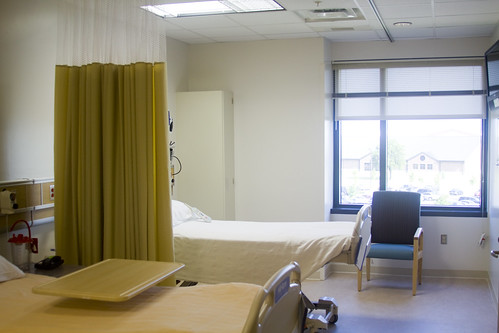 |
| Image courtesy norfolkdistrict FlickR.com |
Joseph was born on a Friday, I had to spend Saturday in the delivery suite hooked up to all my lovely monitors and catheters, until Saturday afternoon when my lovely Dr K finally said "right, catheter out, lines out, you can go up to your room". I was taken to ante natal, into a private room which would be my home for the next 6 days. There are three sorts of people in our antenatal ward. Expectant mothers with complications of pregnancy, expectant mothers with very serious social problems who need to be looked after, and "the delivered", whose babies cannot be with them, but they are not well enough to be discharged home.
It isn't easy being a delivered mother at the best of times, but when your baby is not by your side, its pretty horrendous. Biologically you are going through all the things an ordinary new mum is going through in that immediate post natal period, that period of elation, followed by crushing lowness (baby blues is such a ridiculous term, its more than feeling "a little blue"), your milk coming in, the constant feeling of burning and fullness, and the post delivery bleeding, and if you've had a section, the pain and discomfort of your scar.
In our hospital in both post natal and ante natal you are expected to get your own breakfast. Which, if you are a normal expectant mum, or a delivered mummy, is no biggie, afterall pregnancy is not an illness, and post childbirth isn't either.
So on the Sunday morning I woke up early, expressed, and was looking forward to my breakfast. To my dismay it was all served in big containers with cereal, and huge jugs of milk. My hands were bruised and battered, I still had a canula in in case of emergencies. I had just had my heparin injections and my legs felt weak. I wrapped my hand around the jug handle, and nothing happened. I had nothing left. I couldn't even put milk on my cereal, and the tea was served in massive stainless steel pots. There were no staff members around to help.
One of the mums was standing at the trolley, so I asked her if she could help me, which she was more than happy to do. We got chatting, she'd had her baby on Friday too, and she was knackered. She'd been feeding all night, and exhaustion had reached a peak point. She asked when I was due, and I explained to her that I had had my baby but was put in the "room of the delivered" as he was born at 27 weeks, and they didn't want me to be tortured by being surrounded by new mums. I watched the colour drain from her face. She quietly got my breakfast ready and took it into my room for me. I didn't see her again.
Many months later I was at baby group on a Monday. I was, at the time, very teary, always on edge. My post traumatic stress disorder had been identified but wasn't yet being treated, as I was waiting for a psychiatric referral. I got chatting to one of the other mums whose little girl was enormous, lying on her tummy lifting on to her arms, something Joseph at the time, was still 3 months off doing. We talked about our babies birth dates, they could have been twins..... then her face flashed with recognition. She was the mummy who had helped me.
She looked at Joseph with amazement, and then a tear formed in her eye. She said "I rang my husband after talking to you that morning. I felt so bad whinging about how tired I was when you were going to lose your baby." I went white, I started shaking. "I'm really sorry", she continued, "but I thought a baby born that early would die." And whilst that exchange was, at the time, painful, it was positive. She had become educated. That early babies can not only survive, they can thrive.
I still strongly believe that premature delivery and birth is a taboo, almost as much as pregnancy loss. We don't talk about it as a society. In my pregnancy books and magazines, its sometimes mentioned, sometimes there are even articles, a before and after picture, a birth story, but we don't talk about beyond the glowing success stories.
We don't, as a community, and I believe treating professionals don't either, talk about how we deal with not just the babies, but the parents. My husband was treated the same as any other partner in that hospital. He had to go home at 8pm. I was left, alone, in my little room, with my breast pump and my ipod, my baby a ten minute walk away (and for many other mothers its worse, and I've talked before about babies being accommodated many miles away from the mother).
My husband once, in a heated moment, complained about my "premmie crusade" and how I act like I am the only person in the world who has had a premature baby.
That's where he is wrong. Although there are many, many high points on the premmie journey, they do not compensate for the crushing, frightening lows, the hurt and the trauma that carries on, usually for years, that never truly goes away. If 1 in 8 babies are born premature, sick or small, that means 1 in 8 mothers have gone through and are going through this trauma.
I am on a crusade of sorts. But not to say "look at me, I'm special, I've had a tiny baby", but to increase awareness, to impart to others some knowledge of what its like to have a premature baby, and to help all mothers support and care for one another.
